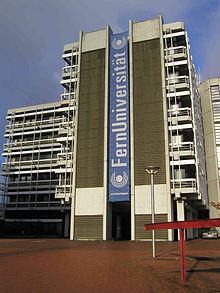FernUniversität in Hagen | |
 | |
| Type | Public |
|---|---|
| Established | 1974 |
| Chancellor | Birgit Rimpo-Repp |
| Rector | Ada Pellert |
Academic staff | 1,824[1] |
| Students | 69,982 (winter semester 2022/23)[2] |
| Location | , , Germany 51°22′38″N 7°29′43″E / 51.37722°N 7.49528°E |
| Campus | Urban Distance education |
| Colors | Blue and white |
| Affiliations | European Association of Distance Teaching Universities ACQUIN AQAS FIBAA EUA |
| Website | www.fernuni-hagen.de |


The University of Hagen[3] (German: FernUniversität in Hagen, informally often referred to as FU Hagen) is a public research university that is primarily focused on distance teaching. While its main campus is located in Hagen, North Rhine-Westphalia, Germany, the university maintains more than 50 study and research centers in Germany and throughout Europe. According to the Federal Statistical Office of Germany, it is Germany's second-largest university.[4] The university was founded in 1974 as a public research university by the state Nordrhein-Westfalen and began its research and teaching activities in 1975. It was founded following the idea of UK's Open University to provide higher and continuing education opportunities through a distance education system in Germany.
The university awards the same qualifications as other German on-campus universities and maintains the same requirements. Initially, the university had only three faculties with 1,304 full and part-time students, but today the university has developed into Germany's leading institution for distance education and is the only full university in that field with a student body of 83,536 students in the summer term of 2013[5] and 86,889 students in the winter term 2013/14.[5][6] Besides the substantial number of off-campus students, a considerable number of full-time postgraduate research students as well as more than 1,800 members of academic and research staff are based on the University of Hagen's main campus in Hagen.
The faculties of the University of Hagen award undergraduate, graduate and postdoctoral degrees and enable habilitation. All the degrees awarded by the University of Hagen are equivalent to those awarded by traditional German universities. The University of Hagen awards degrees and does research in the fields of business administration and economics, mathematics, computer science, law, psychology, cultural studies and political science.[7] The university has produced many notable alumni in the fields of law, economics, business and politics, among them two Gottfried Wilhelm Leibniz Prize winners,[8][9] 1 Gossen Prize laureate,[10] at least 25 university professors, numerous members of the German parliament, and the former Foreign Minister and Vice Chancellor of Germany, Guido Westerwelle.
The University of Hagen is a member of the European University Association (EUA), European Association of Distance Teaching Universities (EADTU) and it is accredited by ACQUIN, FIBAA (Foundation for International Business Administration Accreditation) as well as AQAS (Agentur für Qualitätssicherung durch Akkreditierung von Studiengängen).
- ^ "Zahlen und Daten". Archived from the original on 13 January 2007. Retrieved 21 July 2015.
- ^ "Zahlen und Daten". Retrieved 12 December 2022.
- ^ "Profile of the University". University of Hagen. Retrieved 21 April 2015.
- ^ "Studierende an Hochschulen – Fachserie 11 Reihe 4.1 – Wintersemester 2021/2022 (Letzte Ausgabe – berichtsweise eingestellt)" (PDF). p. 34. Retrieved 12 December 2022.
- ^ a b "University of Hagen: Facts and Data".
- ^ Biazza, J. (17 May 2010). "Gut vernetzt". Süddeutsche Zeitung (in German). Retrieved 12 February 2023.
- ^ "Study and Research Areas at the FU Hagen". University of Hagen. Retrieved 20 February 2014.
- ^ "Prof. Dr. Peter Gumbsch, Institutsleiter". Fraunhofer-Institut für Werkstoffmechanik IWM (in German). Retrieved 12 February 2023.
- ^ "Gossen-Preis für Roman Inderst". Goethe Universität (in German). 9 September 2010. Retrieved 21 December 2023.
- ^ "Einzelansicht". Fachbereich 02 – Wirtschaftswissenschaften (in German). 7 February 2023. Retrieved 12 February 2023.